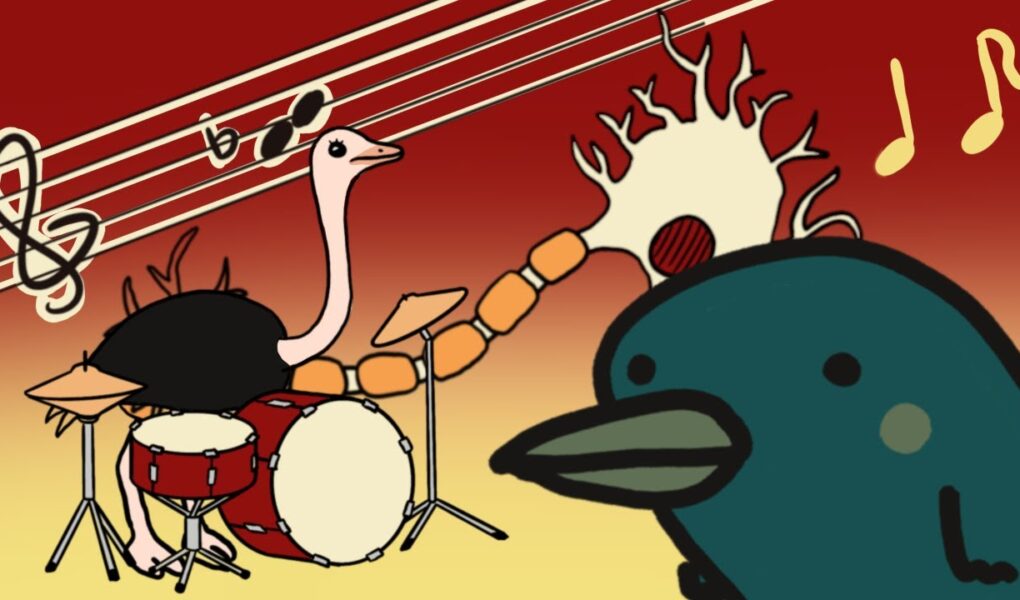Physics for the Birds
Why do humans make and listen to music, despite it not having any obvious benefits? Why do some people listen to jazz, despite it sounding bad?
In this video, we investigate human evolution, the physics of neurons, information theory, and thermodynamics to find the answer.
Become a Patreon member: https://www.patreon.com/PhysicsfortheBirds
0:00 Intro
1:35 Reasons for a sense of rhythm
5:34 Basics of harmony
6:30 The auditory system and neurons
8:45 Solving the neuron equation for chords
12:09 Intro to information entropy
14:48 Entropy and jazz, conclusion
Thank you to Caleb Birtwistle for captioning!
Darwin on music: The Descent of Man, and Selection in Relation to Sex
Pinker on music: http://hampshirehigh.com/exchange2012/docs/Steven%20Pinker%20-%20How%20The%20Mind-Works.pdf (534)
Bipedal Theory: https://www.ncbi.nlm.nih.gov/pmc/articles/PMC3889703/
Ewe drumming: https://www.richardhodges.com/ladzekpo/Foundation.html
Auditory neuron physics: https://pubmed.ncbi.nlm.nih.gov/20481757/
Auditory neuron entropy: https://pubmed.ncbi.nlm.nih.gov/21981535/
George Garzone: https://www.youtube.com/watch?v=6cMufgkivsg (2:58)
Source



Ooh the lick™
yes, walking has rhythms. so does sex. so do build-ups to orgasm. maybe that explains why there are strettos – quickening pile-ons – in fugues in the build-up to the climax.
Really informative and entertaining!
I really appreciate you explaining just some of the math and physics behind sound and music. That’s primarily what I’m interested in, but it’s inspiring to hear someone talk about these subjects who clearly has a background in jazz and music. Like, you get it, and have an incredibly multifaceted understanding of Music and the perception of Music.
Right like how many people only teach or preach one side of what you’re talking about? We need to address the musicians perspective, the neuroscience, physics, math perspective etc. It’s an over encompassing synthesis of information and understanding of Music so thanks!
Jesus do I hate jazz…
Wonderful video, thank you
Kinda like once you recognize patterns you start recognizing imperfections. Once you learn the rules you can start breaking them. It's universal.
mmmmmmmmmmmm jazz
I doubt
those with taste don't
When showing the PDFs for different frequency ratios did you assume both sine functions are in phase?
Edit: I checked is for a few examples and I think phase shifts do not matter.
I've come to believe that It's because people who listens to jazz only listens for Harmony, and find music that lacks it to be simple or boring.
14:18 I'd argue that thinking that something fell on the piano is, itself, a sort of decoding like with the high entropy signal. Without the context of a piano being a real thing that both exists and can have things fall on it, then the three consecutive chromatic notes–like the high entropy signal–means nothing, but with the added context you not only know that something fell on the piano, but WHERE on the piano it fell, and possibly how large and heavy it is depending on how many consecutive keys were pressed and how hard the sound is played.
Oh goawd, I just felt like an AI listening to himself talk, masked as a youtuber, on the subject on information entropy and why this AI prefers structured patterns over garbled noise…. Are we all just advanced AIs?
This video is beautiful! It also adds extra reasons to the list of why birds are the absolutely perfect mascots for these videos (and Yardbird Parker didn’t get his nickname for no reason) 🙂
I’ve been playing jazz saxophone for around 9 years now and just finished my bachelor’s in biology, and I genuinely loved the topics in this video. It scratched the surface of many questions I’d ask as I went through my classes trying to relate my career with my passions.
I'm so sorry but……. no one's gonna talk about the licc at 2:35?
edit: also at 6:23 the just intonation ratio of "E to G" a minor 3rd is not 3/2, that is a 5th (the ratio of c to g) maybe that's what you meant, but its unclear. The 5-limit ratio of a minor third is 6/5 (4/5 x 3/2, or down a major 3rd up a 5th)
No we weren't making music more organized throughout history, It was the exact opposite. By the time jazz came around, Classical music was already breaking out of all sorts of forms and restraints, Jazz and classical influenced each other.
I guess it is similar to starting with a coffee with milk and sugar in your 20s and ending up drinking ristretto only in your 40s. Or starting with being a Marxist or a Libertarian in your 20s and ending up being a Taoist or a Stoic or Buddhist in your 40s and then perhaps praising Nazism in your 60s, but just as a joke (see e.g. Lars von Trier).
It does serve a purpose in a society – it enables creativity and new knowledge discovery.
Does music prime us for this? I don't know. I would go more with Pinker's theory. The fact that some people develop more and more sophisticated musical taste does not make them any smarter in other domains. Just like having more sophisticated culinary, aesthetic, or any other taste does not do that either.
Great video! Thank you!
OK, get it, I am not human
As a jazz musician, physics student and mathematician, my mind was blown in the most enjoyable, entertaining, relevant way…i am truly impressed and i cannot truly put into words how astonishing this was 🤯🤯🤯🤯🤯🤯🤯
hands down the best video on music i have ever heard. i am subscribing to this channel so freaking hard.
i really enjoyed where you showed that the sum of neurons being in sync gives a stronger signal.
got me thinking about what relative phase delay between two tones 2:3 ratio will do to those neural activations
Damn man you presented the F*** out of this. I have never seen such and analysis in all my experience with music and Fourier transforms. Kudos
Ya like jazz?
It’s so good!
Never thought about music this way 🙂
Best video I've watched this year
You got a speech impediment or what
Holy shit am i glad i clicked on this! Amazing.
Really interesting! Actually a set of hypothesis. It may be interesting to you to have a look at C.S. Peirce semiotics (Pragmatism) too where a "musical" ( a sound sequence – a sequence of 1st – forms a diads sequence – a 2nds sequence) & the interpretation possibility is related to a very specific Interpretant (a 3rd).
H.E. "music" as a (logical) Nexus: a Thirdness 4 the case. Add William James works 4 some Interpretant agency possibility (or psychology) …😊
Aaaaaah i needed a video like this! Thank u sm!!!
Please don't stop, love the video
The ability and more interestingly the desire to move rhythmically to music is not linked with having two legs but with being what's called a vocal mimic.
I stopped paying attention for just one fucking second and I find myself at 10:11
People like meaningful patterns. When we become habituated to the pattern, our brains begin to search for new "meaningful" patterns. This explains both music and jazz. ;-P
I'm a physics and math graduate student, and I started to listen and learn playing jazz for years. You are just like another me but with much more talent on explaining and visualizing stuff. Thanks for this exciting topic.
A small error correction: 5:52 I guess that ratio should be 5:4 (major 3rd), also sounds like major 3rd.
As a hearing care professional and music creator I can say this is the best video I have ever seen in my entire life. I am amazed about everything. You are a multi talent! Thank you very much to share this with us.
6 minutes in and one of the best things ive watched on YouTube in a loooong time. So humble, brilliant, and alluring. Great pace and delivery btw!! Thanks so much, gonna sub and explore more. (Im a musician, and Love music more than most things. Victor L. Wooten's books (amazing bass player, and beyound) on Music are also incredible for anyone reading this. )
Sigh.
Classical music was not “peak” oil. It was just that the window available to peep into the world of formalised music was a tiny sliver that was only accessible through the organised institutions of The Church or The Aristocracy.
Both of those institutions are based on strict rules and etiquette which is why the music that developed within them also follow strict rules and etiquette.
Similarly, folk music followed the rules of music being passed from one person to another, so there was no need for notation systems and the rules and conventions that need to be established in order to be able to use a notation system to transmit music remotely
There is no need for a metaphysical explanation of music.
Music has no more meaning than the shapes of a cloud has a meaning. It is absurd in nature. That’s what makes it magical.
Like a Dali landscape.
Mathematicians and Physicists are always comparing music with mathematics. But they’re phenomena of polar opposites really.
Music probably doesn’t even count as phenomena in the empirical sense.
Physics and maths are incredibly useful for understanding and modelling reality.
Music, less so.
So it’s got that going for it.
2:35 you sly devil you…
Now i have more understanding of why i dont like jazz but many musician do. Its like jazz is a musician genre